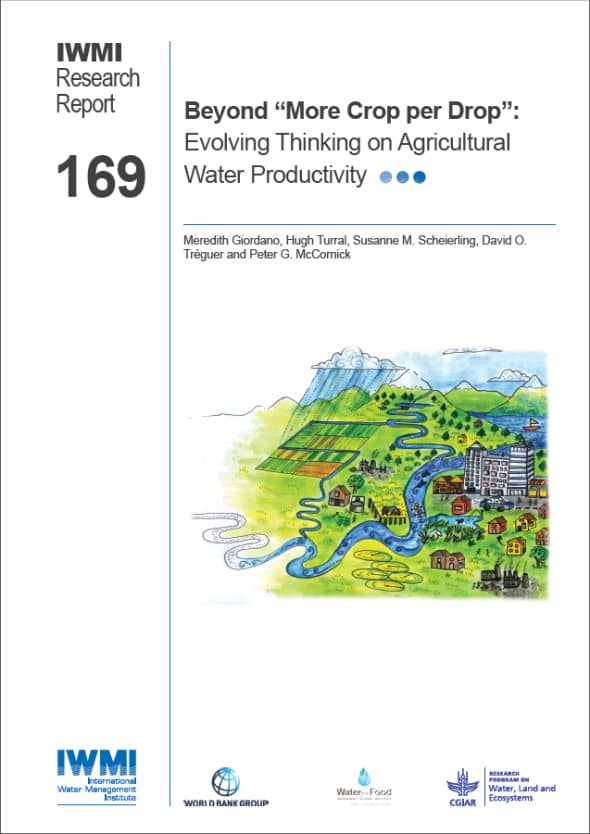By Jialan Deal, Elizabeth Stifel and Sophie Gregrowski
From assessing drought in Zambia to future-proofing freshwater biodiversity emergency recovery plans, IWMI researchers have contributed to a wide range of studies from around the world. The following is a selection of their open-access work published in September and October 2024. To read the full articles, click the DOI links below.
Mapping a sustainable water future: Private sector opportunities for global water security and resilience
Water security is an important global development challenge yet securing adequate funding for water-related projects remains difficult due to public funding limitations. The private sector offers a significant opportunity to bridge this gap. To tap into this potential, it is essential to establish pathways for identifying and fostering innovative private sector engagement in water security efforts. IWMI’s William Rex and fellow researchers find that two-thirds of the global population could benefit from private sector interventions, with middle-income countries standing to gain the most. His team developed a global framework for targeting private sector investments by using quantitative tools to analyze complex environmental and socioeconomic water challenges. Based on this analysis, they identified and prioritized areas where private sector investments could have the greatest impact. This approach culminated in the development of the first global and regional maps, which visually highlight where water security threats align with private sector opportunities.
Read more here.
Embracing complexities in agricultural water management through nexus planning
In the 21st century, agricultural water management (AWM) will face the challenge of feeding a growing population, which is complicated by intersectoral resource competition, evolving diets, land degradation, pandemics, geopolitical conflicts, and climate change. Accomplishing this must be achieved without compromising people’s livelihoods and environmental objectives linked to water. In a paper published in Irrigation and Drainage, IWMI’s Mark Smith, Alok Sikka and co-authors used a systems and nexus lens to examine the complexities of AWM, in particular, the interconnected dimensions and objectives of AWM, as well as its practices and technologies. By using integrated nexus thinking beyond water to present the centrality of AWM, the authors highlight the interconnected of AWM in diverse areas including resource security, health, climate change and sustainable development. They find that contextualizing AWM within socio-ecological and socio-economic systems and their challenges provide a solid foundation for creating solutions.
Read more here.
Assessing El Niño-induced drought in Zambia and its effects using earth observation data
Zambia is grappling with severe impacts from El Niño, including a devastating drought. IWMI’s Surajit Ghosh and his team leverage open-access Earth Observation data and cloud analytics to assess the extent and multi-sectoral effects of this drought. Their findings reveal that 40.46% of Zambia experienced meteorological drought conditions in 2023–2024, marked by drastically low rainfall. The drought has caused widespread crop failures, undermining food security, and significantly affected hydropower reservoirs, limiting the country’s energy generation capacity. These results underscore the urgent challenges Zambia faces in food and nutrition security and the need for proactive stakeholder engagement and policy development to mitigate future crises and support vulnerable communities
Read more here.
Flood risk assessment under the shared socioeconomic pathways: a case of electricity bulk supply points in Greater Accra, Ghana
The Greater Accra region of Ghana has experienced several major flooding events in the past decade, which damaged key power assets and caused blackouts across Accra and surrounding areas. Bulk supply points (BSPs) that deliver electricity from generating plants to end users are particularly vital to protect from flooding as damage to them can cause disruptions to the rest of the downstream supply chain. IWMI researcher, Komlavi Akpoti, and his co-researchers evaluated flood susceptibility and risk to BSPs using a Frequency Ratio model based on flooding conditioning factors. The researchers determined using future projections that over 75% of BSPs are expected to fall in the low- to medium-risk categories across shared socioeconomic pathways and more than 50% of BSPs are within medium- to high-risk categories in all but one scenario. These findings illustrate an urgent need to adapt the Great Accra region’s power infrastructure to the threat of increased flooding events through upgrades such as flood barriers, elevated equipment, and infrastructure hardening at high-risk points.
Read more here.
Future-proofing the emergency recovery plan for freshwater biodiversity
Freshwater biodiversity is essential to wellbeing and livelihood, but human impact has accelerated freshwater biodiversity loss globally. Actionable planning and coordination on a global scale is necessary, hence the Emergency Recovery Plan, which aims to reduce risk for freshwater biodiversity loss through six priority actions. IWMI’s Matthew McCartney and co-researchers showcase how the actions within the Emergency Recovery Plan can be effectively implemented with future-proofing approaches. Researchers used local case studies and examples to display principles of successful future-proofing while drawing on anticipatory shifting conditions. They conclude that future-proofing response options are crucial to the implementation of the Emergency Recovery Plan and will provide decision makers with necessary context for science-informed choices to create a sustainable future.
Read more here.
Informal irrigated vegetable value chains in urban Ghana: potential to improve food safety through changing stakeholder practices
Hygienic and safe vegetable production is crucial for public health; farmers, traders, street-food vendors, and consumers are all key stakeholders in the vegetable value chain. In order to promote safe practices, IWMI’s David Galibourg and co-researchers explore why these stakeholders in Accra may continue unsafe practices. Using interviews and focus groups, researchers collected data about the groups and the behaviors that most impact hygiene and food safety. Researchers found that there exists a need for stakeholders to share one another’s practices to better integrate the diverse set of knowledge, incentives, and constraints. Thus, political commitment, collaborative governance, and co-designed arrangements accounting for land tenure are needed to enable safe urban vegetable production.
Read more here.



